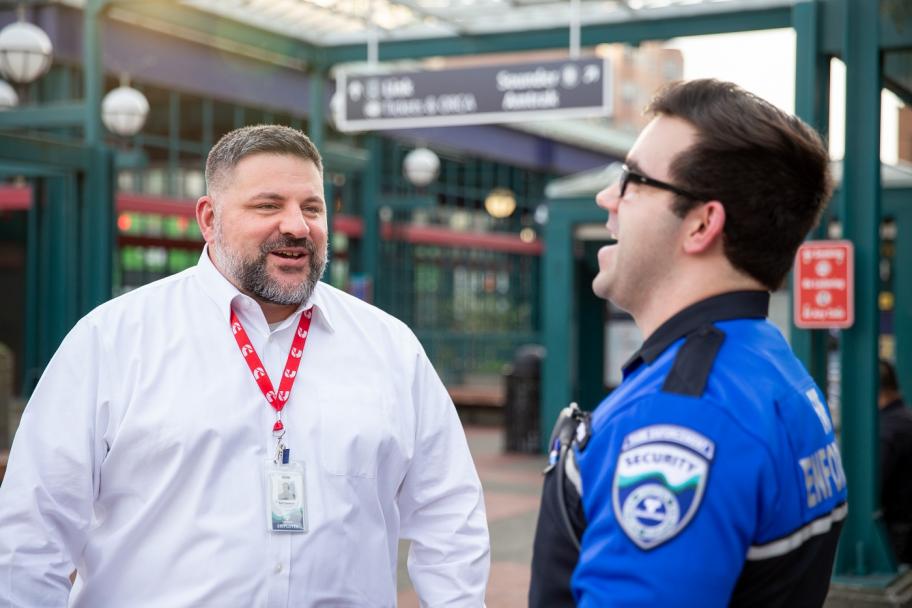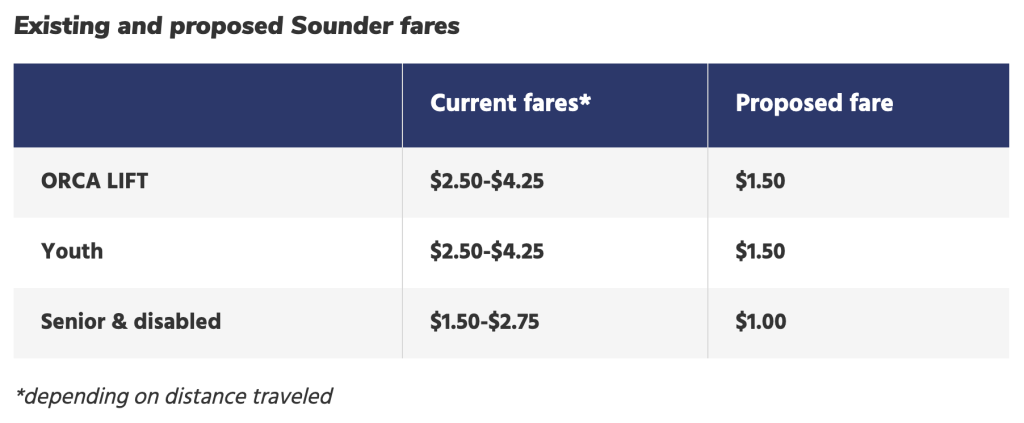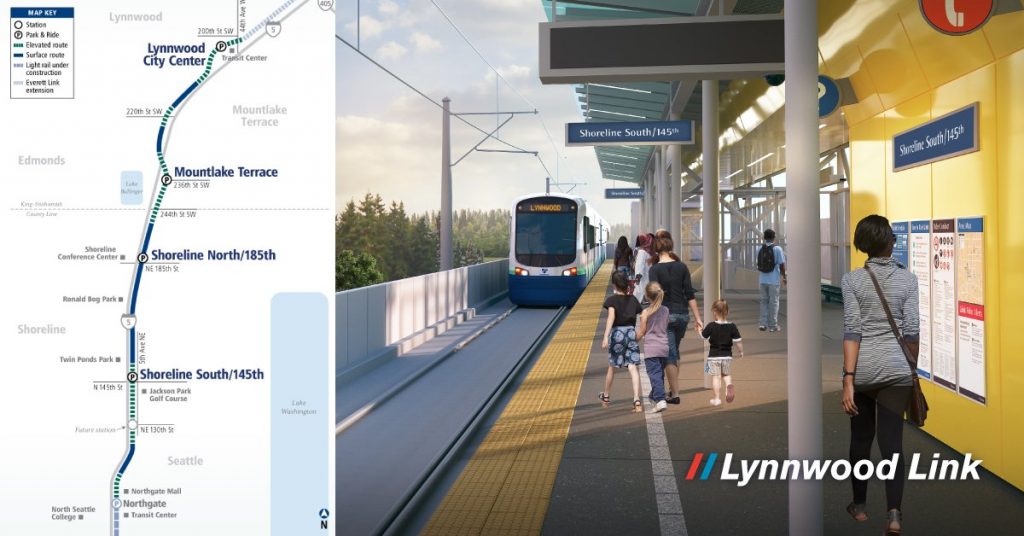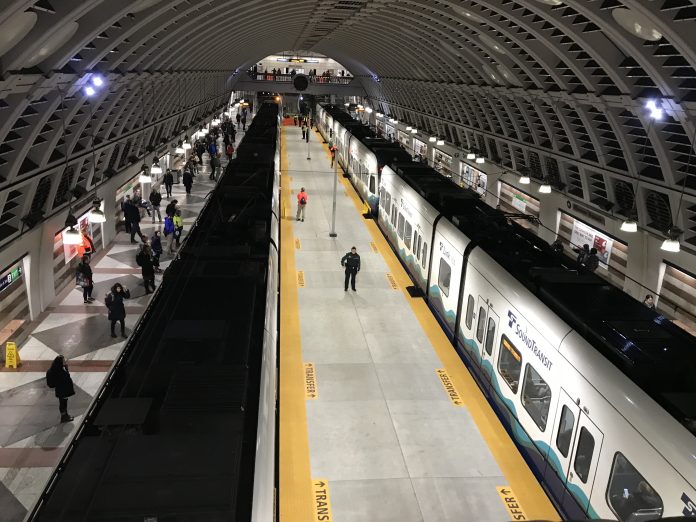On Thursday, the Sound Transit Board of Directors met for their final time in 2020. The meeting closed the year by taking up big actions on fare enforcement reform, and the board lowered youth, ORCA LIFT, senior, and disabled fares on Sounder trains and approved the 2021 budget. The board also authorized several agreements with the City of Shoreline and issued an updated state legislative policy directive.
Early on during the meeting, Sound Transit CEO Peter Rogoff expressed hope that Congress would approve a funding deal, as part of a continuing resolution that funds the federal government, to include additional emergency funding for local transit agencies. He estimated that the deal would provide $15 billion in assistance to transit agencies across the country, a far cry from the $36 billion transit agencies have been asking for. But it would directly provide $97 million to Sound Transit under typical federal funding formulas and other local transit agencies could receive $207 million.
Rogoff also mentioned that the agency has made significant progress on the Lynnwood Link Extension. As of last Friday, Sound Transit had completed 25% of civil construction, including all drilling of shafts for the concrete columns supporting aerial guideway and pouring 130 of 188 columns. Fifty guideway spans have also be laid down on the columns. Separately, Rogoff said that testing on the Point Defiance Bypass–a conventional single-track passenger railway between Lakewood and Nisqually Valley for use by Amtrak–will begin on January 16, 2021. That is one of the final steps to reopening the corridor for Amtrak Cascades and Coast Starlight use next year with positive train control safety systems.
An equity-minded pilot of fare enforcement reform
As we reported last this week, Sound Transit will begin a new pilot fare enforcement program in 2021 that will focus on more positive interactions with riders that focus on de-escalation and anti-bias practices. Known as the Fare Engagement Ambassador Pilot Program, current fare enforcement officers will be redeployed to security duties at transit stations while new ambassadors will be hired to canvass trains to provide information and issue warnings for non-payment to riders in violation of fare rules rather than citations. They will also be wearing distinctly different uniforms than fare enforcement officers traditionally wear.
During the pilot program, Sound Transit will continue to suspend all citations for non-payment of fares and agency staff will work with stakeholders to re-envision fare enforcement practices and monitor how the pilot program is operating. At the end of the pilot program, the agency will need to provide a report on the pilot program, cost-benefit and cost-effectiveness of the fare enforcement program, details on the previously-approved Fare Enforcement Action Plan, and any new recommendations from the fare enforcement and engagement process.
In terms of recommendations, the board has asked that Sound Transit provide a new fare enforcement program and implementation plan that addresses six topic areas. These include fine amounts for citations, warning methods, alternative citation resolution options, appeal processes for citations, alternative methods to suspension of riders for fare evasion, and metrics and measures for ongoing program evaluation.
Furthermore, the board has requested that agency staff draft a new Fare Enforcement Policy that could include six specific policy approaches or offer alternatives. These include lowering fines to no more than $50, increasing the number of warnings in a 12-month period to two, modifying the suspension policy, eliminating law enforcement from fare evasion-only situations, including bus rapid transit in the policy since Stride will launch in 2024, and removing the courts from fare evasion-only cases.

However, King County Councilmember Joe McDermott’s wish for eliminating the courts from the fare enforcement process entirely is still up in the air. Agency staff will take a look a look at the issue and may have recommendations on it next year, but the board may decide to keep the courts in the process for civil infraction citations that escalate from non-payment cases. Board Chair and University Place Councilmember Kent Keel reiterated that he believes a policy can be worked out that separates people who legitimately cannot pay fares due to personal economic circumstances from people who are just skipping fare payment because they do not think they will be caught.
The full fare enforcement motion passed, which will require that agency staff provide a full report, recommendations, implementation plan, and draft policy update by January 2022. Throughout the the process, agency staff will also need to deliver quarterly updates to the board highlighting progress that has been made.
Lower Sounder fares

Lower fares will also be coming in March on Sounder commuter rail services when the spring service change (March 21, 2021) goes into effect, and a 15-1 vote with only Seattle Mayor Jenny Durkan voting no, which her explanation offered belatedly after the vote. Fares for youth, seniors, people with disabilities, and people with low incomes will be reduced and simplified. Under the current fare system, these ridership categories are based upon distance. The new fares will be flat, bringing them in line with corresponding ST Express bus and Link light rail fares.
Youth and low-income people with ORCA LIFT cards will be charged $1.50 fares while seniors and people with disabilities will be charged $1.00 fares on Sounder services. This would allow these riders to transfer seamlessly across all Sound Transit services and other local transit agencies like King County Metro at no additional cost.
Motor vehicle excise tax reform
The board largely adopted the baseline proposed policy for state legislative priorities, which includes working to create new flexible revenue options that support transit investments, opposing legislation that would increase the cost of delivering transit projects and services, supporting the efforts of other transit agency partners, and reforming the Motor Vehicle Excise Tax (MVET) while maintaining a revenue neutral outcome in Sound Transit’s capital program. However, there was some finagling over language from the latter.
Pierce County Executive Bruce Dammeier sought to create a clearer directive in achieving MVET reform while also leaving Sound Transit whole through an amendment to the priorities. Claudia Balducci, a King County Councilmember, worried about what practical impact that amendment could have, such as whether or not the proposed language change could be open to reducing the MVET and relying on a much more regressive tax option like the sales tax.
Traditionally, the Washington State Legislature has proposed bills that simply adjust the MVET formulas and cut billions in funding from Sound Transit with no meaningful offsets. That has led Sound Transit to lobby against the straight cuts in favor of offsets, but the legislature has rarely critically dealt with this, leading to bills failing entirely. So the cyclical battle has been effective in staving off cuts, but not delivering any sort of compromise reform.
In terms of Dammeier’s amendment, the board ultimately dispensed with concerns and took his language, but it remains to be seen what if anything the legislature might do in the upcoming 2021 legislative session on this front since it is likely to be dominated by Covid-related public health and economic issues.
2021 budget
The board also approved the annual budget and 2021 Transit Improvement Plan. The 2021 budget will top $3.085 billion with the bulk of funding going to system expansion, such as the Lynnwood Link and Federal Link light rail extension programs as well as Stride bus rapid transit, commuter rail and light rail vehicle fleet expansion, and Puyallup Station expansion. The budget specifically has allocated $2.261 billion for system expansion expenditures in the year ahead. Another $36 million has been dedicated to non-expansion system enhancements and $46 million in State of Good Repair projects such as ORCA Next Gen projects and escalator and railway maintenance and repair. Transit operations will be funded at $380.6 million, which break down as $168 million for Link, $138 million for ST Express, $68 million for Sounder, and $7 million for Tacoma Link. As a year-end technical amendment, the board also increased the 2020 budget for Link system expansion by adding $30 million, raising from a total budget of $1.965 billion to $1.995 billion.

Lastly, the board wrapped up with approval of two agreements with the City of Shoreline. The first is a land swap that will give Sound Transit property from the City in exchange for vacated city right-of-way that is needed to complete the Lynnwood Link Extension. Right-of-way vacations are intended to be partial vacations of NE 185th St and 7th Ave NE to facilitate the Shoreline North/185th Station and its parking garage.
The second is a partnering agreement that establishes roles, responsibilities, and schedule and budget expectations to deliver the SR-522/NE 145th Stride bus rapid transit project that will pass through and serve Shoreline. Partnering agreements are designed to improve the permitting process by making Sound Transit projects a priority, designating interagency contacts and relationships, and containing project definition. Fortunately, Shoreline has already approved the partnering agreement meaning that it will now come into force.
Stephen is a professional urban planner in Puget Sound with a passion for sustainable, livable, and diverse cities. He is especially interested in how policies, regulations, and programs can promote positive outcomes for communities. With stints in great cities like Bellingham and Cork, Stephen currently lives in Seattle. He primarily covers land use and transportation issues and has been with The Urbanist since 2014.



